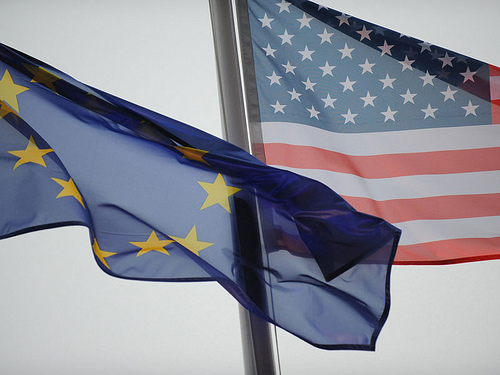
Russia ratifies new START treaty, Ireland votes on its finance bill, and the fallout from Monday’s Moscow airport attack.
HEADLINES:
Kroes gives Hungary an ultimatum on media law (EUObserver)
The EU commissioner in charge of media issues, Neelie Kroes, has raised "serious doubts" about Hungary’s new media law in a letter to Budapest and given the country a two-week ultimatum to the government to explain itself. Hungarian leader Viktor Orban however said the law was intended to combat racism.
Russia Ratifies US Nuclear Disarmament Treaty (Radio Netherlands Worldwide)
The day after it passed in the lower house, the upper house of the Russian Parliament approved the New START nuclear arms control treaty between Russia and the United States.
Russia Airport Bomb: Medvedev Sacks Key Officials (BBC News)
In the shadow of yesterday’s attack on Moscow’s airport, the success of Russia’s war on terror is being questioned, with key officials being sacked.
Irish government on brink of collapse (Guardian)
The Irish government is teetering on the brink of collapse today as three independent TDs threaten to vote against the finance bill. Three independents – Mattie McGrath, Michael Lowry and Jackie Healy-Rae – are now holding the Brian Cowen and Brian Lenihan’s dying government to ransom with a new "wish list" of amendments to the bill. Their approach has been criticised as more evidence of "the country’s reputation for insanity".
Ukraine, Turkey set up ‘strategic partnership’ (EurActiv)
Turkish Prime Minister Recep Tayyip Erdoğan was in Kiev yesterday (25 January) where he signed with Ukrainian host Viktor Yanukovich a "strategic partnership" between the EU’s two biggest accession hopefuls. EurActiv Turkey reports. Following talks with his host, Ukrainian President Viktor Yanukovich, Erdoğan said both sides had agreed to start negotiations on setting up a free trade area and on removing visa requirements for their citizens.
Cameron urged to back down over cuts (The Independent)
Prime Minister David Cameron came under pressure from Labour today to back down over plans to cut public spending following grim GDP figures. Labour leader Ed Miliband urged the Prime Minister to "put his arrogance aside" and acknowledge his plan was not working. As the pair clashed at Prime Minister’s Questions, Mr Cameron insisted the deficit inherited from Labour needed to be tackled and claimed Mr Miliband’s alternative was to borrow more and "spend money on things we can’t afford".
EU bluntly tells Albania to solve crisis now (Reuters)
The European Union told Albania’s crisis-riven government and opposition on Wednesday to urgently "restore calm and full respect for public order and rule of law" after Friday’s deadly anti-government protests.
EU foreign policy chief Catherine Ashton’s envoy, Miroslav Lajcak said, "I reminded your political leaders of their shared responsibility for preventing any further violence and bloodshed, the functioning of state institutions and respecting state institutions. No one is above the state institutions."
"I made it clear that the European future for Albania depends very much on whether the political leaders choose to do what we ask them to do, and do it now," Lajcak told reporters after meeting key leaders.
EDITORIALS AND COLUMNS:
British Economy Heading South – and Fast (The Guardian)
There are two ways to read yesterday’s GDP report. The first is as a glance in the rear-view mirror – a useful check on how the economy has just fared, but little more than that. But every so often along comes a release that is so extraordinary it should be treated instead as a direct challenge to government policies. That is the case with yesterday’s health check, which shows national income heading south at a rate of knots – and throws back a question at George Osborne and David Cameron: with the economic outlook so bleak, isn’t it time to rethink the coalition’s austerity plans?
Stopping the Trans-Atlantic Drift (Constanze Stelzenmuller and Tomas Valasek, International Herald Tribune)
You might call it the Obama paradox: Atlanticists on both sides of the ocean were certain that this president, inaugurated two years ago, would renew the trans-Atlantic alliance.
Yet two years later, the United States and Europe seem further apart than they have ever been in their policies as much as in public attitudes. For the United States, Europe appears to be less relevant than ever; in Europe, anti-Americanism seems to be drifting into simple indifference.
Image: transatlantic.jpg
